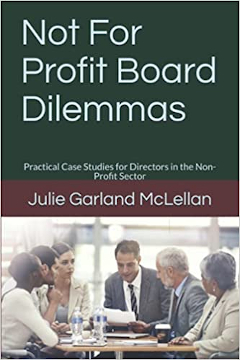|
|
|
|
|
|
|
|
|
Dear reader,
Welcome to the September issue of The Director's Dilemma newsletter. Every month this newsletter looks at a real-life board scenario and considers a range of responses.
This month we think about how to handle a sensitive issue for a new director who lacks 'social capital' in the boardroom.
To read this email in a web browser, go to www.mclellan.com.au/newsletter.html and click on 'read the latest issue'.
I hope you will enjoy the latest dilemma.
The Dilemma
Quang has recently joined a mid-cap listed board. She was keen to work with the company because it has suffered over the past three years and now seems to be pulling through its difficulties and poised for greater success. She has been impressed by the level of detailed business knowledge of the directors as they interviewed and briefed her during recruitment and induction.
Last week she met the chair for an informal dinner to share her insights after two months on the board. The chair suggested a very good restaurant and insisted on paying for the meal. He then reassured her that it was fine because he had a credit card that he could use for anything he liked, and the company would just pay it off in full every month. Quang was worried by this and checked with a couple of the other directors to see if it was true or if the chair had just said this to make her feel better about not paying her half of the dinner.
Both the other directors confirmed that the chair did indeed have a company card that he used and that they didn't bother checking or approving the payments because the chair so often went over and above his duties for the company.
Quang is concerned because she is worried that the payments may not be adequately disclosed and, as the company is listed, these payments might take the company beyond the cap that shareholders have granted for payment of board fees. She knows that her appointment has taken the board very close to that cap.
How can she remedy this situation?
|
|
|
|
Marcela's Answer

Quang is right to be concerned about the use of the company credit card, especially in the context of a listed company where transparency, accountability, and governance standards are critical. In this case, Quang clearly felt something was wrong - so much so that she went to others to verify. Gut feelings are important as they can point to larger issues, so it is always important to take note of them. However, these feelings should always be verified as she has rightly done.
Quang is in a challenging position: she has a concern but is still new and unfamiliar with the practices of the business. Instead of questioning directly and causing unnecessary discomfort, she should use the recency of her arrival as an excuse to review the company's policies on expenses as well as governance documents, and ensure that the company is complying with any relevant regulatory requirements for listed companies. Once informed, rather than raising direct concerns at the next board meeting, Quang could suggest a regular review of all company expenditures as well as its cash position overall. She could even suggest the creation of a high-level dashboard where key company insights and information are measured and presented at every meeting, thus offering an effective way of tracking metrics and increasing successful business outcomes.
Marcela Sabino is CEO of Rio Immersive (a VR, AR and AI tech company), her past roles include time with Antler (VC Fund), 500 Start Ups (VC Fund), and Museu de Amanha. She is currently based in London, United Kingdom.
|
|
|
|
Julie's Answer

Informal arrangements are dangerous. Quang is right to be concerned.
Her chair has made her immediately complicit in a practice that she did not have any part in designing and which would not be uncovered during normal due diligence prior to joining. However, she doesn't have any strong relationships or leverage to use in remedying the situation. She must convey her unease without breaking the new relationships with the board that she needs to build.
This board has been through 'tough times' and had to put in hours of work and take risks that are not adequately compensated by 'normal' directors' fees.
Quang could start by commending her colleagues for this during the regular in camera session. Then she could suggest the board look at the official remuneration of directors (included in the governance reports) and the pool of funds for director pay (included in the minutes of the AGM at which it was last amended). Her appointment has brought directors close to the official cap. It would be prudent to take a resolution to the next AGM to increase the pool so that there is a buffer for future fee increases or additions to the board.
As part of this discussion, she can raise the idea of looking to 'regularise' board and director expenses to meet expected governance standards. Without any criticism of the improper arrangement that was made, she needs to build support for proper arrangements that will pass muster during audits in the future and when the company raises fresh capital to fuel the expected growth.
Julie Garland McLellan is a professional company director with experience on 25 boards. She is also one of Australia's leading board consultants offering training, mentoring, and evaluations for boards and directors. She is based in Sydney, Australia and travels worldwide.
|
|
|
|
Kevin's Answer

Typically, a newly appointed Board Member should have completed their due diligence on the company prior to joining a board and have an understanding of its corporate culture, financial performance, strategy, challenges, opportunities and strength of its Board and Executive.
New board members need to listen, observe, and learn in their first year. They are also being assessed by their fellow board members and management as to the contribution and value they bring to every discussion and decision.
Fundamentally, review and approval processes for a mid-cap listed company should be in place for establishing credit, approval of expenses, and use of corporate resources. These processes should follow well established and documented policies and procedures.
Most often, board members are underpaid for the value, experience and network they bring to an organization. Particularly true in a turnaround situation. A discretionary business expense account (reflective of the financial situation of the company) is not unusual for the Chair, CEO and senior leaders. A company credit card facilitates this and should fall under the requisite approval processes. However, there are caveats to such spending. There should be a mechanism whereby limits cannot be exceeded (financial / nature of expenses) and any personal expenses are charged-back. Although, individuals sometimes like to boast about what they can do with their "expense account". Often these boastings are overzealous exaggerations. Always exercise good judgement and first seek facts and evidence.
Quang's first interaction with the board and/or management should not be to question the Chair's expenses - particularly the dinner expense with her. This is a very high-risk strategy if the appropriate policies, procedures and approvals are in place (she could request to see copies). If a Code of Conduct and/or an approval process is not in place, that's a broader issue and should be addressed beyond just the Chair's expenses.
Quang first needs to establish her reputation and build relationships. Initially, she must stay focused on the substantive business and key issues facing the board namely: strategy, financial performance, risks, succession planning, transformational technologies etc. which will drive shareholder value.
Kevin Hall is Managing Partner of Bluestone Leadership Services / AltoPartners Canada and Member of the AltoPartners Global Operating Committee. Kevin is a Fellow of the Institute of Chartered Accountants in England and Wales. He is an alumnus of Ernst & Young, KPMG and Bearing Point. He is based in Calgary, Alberta, Canada.
|
|
|
|
Chat GPT's Answer

Quang should address this situation with a focus on transparency and adherence to corporate governance standards. Here's how she can remedy it:
1. Review Company Policies and Legal Requirements: Familiarize herself with the company's policies regarding the use of corporate credit cards and the disclosure requirements for board expenses. As a listed company, there will be stringent regulations governing financial disclosures and related party transactions.
2. Initiate a Formal Discussion: Request a meeting with the chair and relevant committee members, such as the audit committee, to discuss the use of the company credit card. Express her concerns professionally and seek clarity on how such expenditures are tracked, approved, and reported.
3. Ensure Proper Documentation: Recommend implementing or reinforcing procedures for documenting and approving all expenditures made on behalf of the company. This should include regular reviews and approvals to ensure they align with the company's financial policies and shareholder agreements.
4. Verify Disclosure Practices: Check the company's financial disclosures to ensure that all board-related expenses are properly reported. If there are gaps, suggest corrective measures to ensure compliance with regulations and transparency to shareholders.
5. Suggest Governance Enhancements: Propose establishing a policy or strengthening existing ones regarding the use of company funds for personal expenses and board-related activities. This should include clear guidelines on spending limits, approval processes, and reporting requirements.
By taking these steps, Quang can help safeguard the company's financial integrity and ensure compliance with governance standards, thus protecting both the company and its shareholders.
Chat GPT is an artificial intelligence (or a pattern recognition, data analysis, and prediction engine). It resides in Cyberspace.
|
|
|
|
Experience Julie in Real Life - list of upcoming opportunities
I really enjoy meeting the readers of this newsletter. I have a busy few months ahead and will be:
If you are interested in having me speak at your event or provide training for your team, please respond to this email. I would be delighted to discuss how I can assist in meeting your needs.
If you enjoy my videos on LinkedIn you can always see me in cyber-space by checking out my YouTube channel
Book review : Not-For-Profit Board Dilemmas

-
A book of practical case studies to help directors on not-for-profit boards to build skills and judgement. Why do people join the boards of not-for-profit organisations? Enthusiastic, altruistic and generous people give their time and effort to make a success of organisations in the arts, sports, health, education, religious and other sectors. The work is unremunerated yet rewarding; tiring yet energising; risky yet necessary.
-
The reasons for supporting any particular cause are many. So are the events that can, will and do happen inside the boardroom. Events that can see directors jailed, fined, publicly vilified or praised, respected and promoted. Good judgment can make the difference.
-
Working through the case studies in this book will help directors to make better decisions. Based on real life events in modern not-for-profit organisations these case studies will help directors to identify the key legal and practical issues and craft a winning strategy for their organisation. They are fun to read but seriously educational.
-
Nobody knows what to expect in the boardroom. Stuff happens. Directors need to react to the circumstances. They need to be aware of the people, the environment and the legal requirements of their role. They need to build success. These organisations are too important to fail. Directors need to guide them towards sustainable success by making the right decisions, in time, every time.
Written by an international expert and with contributions from forty board practitioners this book offers practical insights and clear examples to follow.
Buy This Book at Amazon
Board reviews - Every board - just like every other team - needs to measure its performance if it hopes to improve. When your board next needs to conduct a performance evaluation or a governance review, please remember that I would be delighted to help. You can contact me at julie@mclellan.com.au.
Inspirational quote for September

If your board papers could cure insomnia, or if the people speaking to the papers lack presentation skills, remember that it is your job to speak up and drive improvements. There is plenty of training available to help you get better information that educates, informs, excites and enthuses your board.
This newsletter - If you have any ideas for improving the newsletter please let me know. If you are reading a forwarded copy please visit my website and sign up for your own subscription.
Suggestions for dilemmas - Thank you to all the readers who have suggested dilemmas. They are greatly appreciated. I will answer them all eventually. I could not write this newsletter without your help and without the generous help of all the experts who respond each month to the case studies.
Be a contributor - If you would like to attempt a response to the dilemmas for publication you will be most welcome. Simply reply to this email and let me know. I am always on the lookout for new talent from around the world so please reach out if that sounds like something you could do. I am also always grateful for the generous sharing of the current and past contributors. I couldn't create such an engaging newsletter without their help.
Spread the word - If you have read this far, I assume you enjoy the newsletter - please help me to reach more directors by sharing the newsletter with your board colleagues and suggesting that they also become subscribers or by posting a recommendation on my LinkedIn page to let others know that you find the newsletter valuable.
Let's connect - I use LinkedIn to share information about boards and directorship with my friends and acquaintances. If you use LinkedIn and we are not yet connected I will welcome a connection from you. You can find me at linkedin.com/in/juliegarlandmclellan.
Farewell until the next issue due 1 October 2024. I look forward to greeting you again then.
Enjoy governing your companies, it is a privilege!
Best regards,
Julie

Quote Illustration by Julie Garland McLellan
Disclaimer - The opinions expressed above are general in nature and are designed to help you to develop your judgement as a director. They are not a definitive legal ruling and do not constitute legal advice. Names and some circumstances in the case study have been changed to ensure anonymity. Contributors to this newsletter comment in the context of their own jurisdiction; readers should check their local laws and regulations as they may be very different.
Privacy - I am privileged to have your contact details and keep them as safely as possible. I will alert you if they are ever accessed by any unauthorised person (the technical staff at ayuda help with publishing and issuing the Director's Dilemma and have access so they can send the newsletters to you). I do not sell your details to anyone; they are kept only for the intended purpose - sending you this newsletter and helping to build the judgement of company directors by providing a safe way to consider potential responses to real life events.
|
|
|
|
|
|
|







